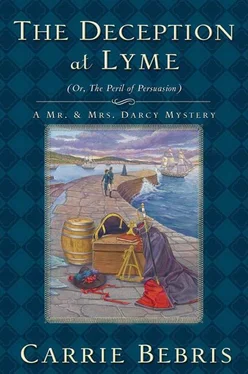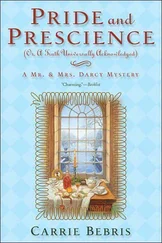Carrie Bebris
The Deception at Lyme:
Or, The Peril of Persuasion
To my father and my godmother
I realize, dear reader, that you are anxious to page through all of this front matter and reach the prologue, where the story begins. But it actually begins here. For while it is my name that appears on the cover of this novel, there are a great many individuals who contributed to its creation, and were it not for them, the story you are about to enjoy would not exist in its present form.
I must, as always, first thank my family. In addition to the very patient and understanding husband and children who live with me during the day-to-day writing, I am blessed with an extended family whose support and encouragement also nurture my creative soul. For this novel, I am particularly grateful to my father for accompanying me to England as my research assistant, for taking countless photos and walking countless miles, for helping me see the navy through the eyes of one who served, and for flinching only a little bit on our first day of driving on British roads.
I thank my editor, Kristin Sevick, for her editorial guidance, for her belief in this book, and for all her support that enabled me to write the story as it needed to be told; my agent, Irene Goodman, for her sound advice and humor that keeps everything in perspective; and my publicist, Cassandra Ammerman, for her promotional efforts on behalf of me and the Darcys.
Artist Teresa Fasolino amazes me with her ability to take my novels and capture their essence on canvas. For the painting on the cover of this book, and those of all the Mr. & Mrs. Darcy Mysteries before it, she has my continued admiration and gratitude.
Friends and fellow writers Mary Holmes, Pamela Johnson, Victoria Hinshaw, Anne Klemm, and Sharon Short offered ideas, criticism, and support at critical stages of the book’s development. I am also grateful to the Sisters of St. Joseph for providing a quiet retreat where I could regain my creative focus and write.
Of the many individuals who answered numerous research questions, I am especially indebted to two people who not only shared their specialized knowledge but also helped me apply it to the unique circumstances of my story: gynecological surgeon and Regency medical expert Dr. Cheryl Kinney, and historical weaponry and military expert Kristopher Shultz. Thanks also to the guides and staff of Portsmouth Historic Dockyards (particularly the HMS Victory ), the Royal Marines Museum, National Maritime Museum, and Lyme Regis Museum. Special thanks to Natalie Manifold of Literary Lyme Walking Tours for her private tour of Jane Austen sites with an extended concentration on the Cobb. Closer to home, the reference librarians at Woodbourne Library hunted down all sorts of obscure old books and managed to obtain them for me.
From the day I joined the Jane Austen Society of North America twenty years ago, its members have generously shared their knowledge, enthusiasm, and friendship, and I deeply appreciate the support I have received since I first started writing the Darcy series. I also thank the Jane Austen Centre in Bath and the staff of Jane Austen’s House Museum in Chawton for their warm reception.
Finally, I thank you, my readers. Your comments, criticism, and enthusiasm have helped shape this series, and are a daily inspiration.
The report of the accident had spread among the workmen and boatmen about the Cobb, and many were collected near them, to be useful if wanted, at any rate, to enjoy the sight of a dead young lady, nay, two dead young ladies, for it proved twice as fine as the first report.
—Persuasion
“We none of us expect to be in smooth water all our days.”
—Mrs. Croft, Persuasion


The quay and southern arm of the Cobb, where the Darcys form more than one new acquaintance … not all of them pleasant.

The “gin shop,” where a lost hat leads to an unexpected find.


Far steps on the Cobb’s southern end, scene of a hurried descent.

Captain Harville’s cottage in Cobb Hamlet, down the lane from the Sheet Anchor pub.

Granny’s Teeth, site of a shocking discovery.
The Cobb itself, its old wonders and new improvements… are what the stranger’s eye will seek.
—Persuasion
On the southern coast of England, near the town of Lyme Regis, an ancient seawall rises from the water.
Like a great openmouthed serpent, its head reaches into the sea, its jaw acts as a quay, its body curves round to form a harbor, its tail stretches to the shore. Known as “the Cobb” for reasons lost to time, this man-made barrier more than half a millennium old is but a youthful newcomer to a wild, unstable coast where prehistoric creatures once dwelled.
Were it not for the Cobb, there would be no harbor, and were it not for the harbor, there would be no Lyme, for the rugged shoreline the seawall faces offers no natural protected anchorage. The construction of the wall proved the making of the town, their fates and fortunes entwined. From simple medieval beginnings, the Cobb, the harbor, and the village together evolved into a thriving port worthy of royal notice.
In this haven, ships were built and launched, trading vessels unloaded exotic wares, sailors returning from distant lands found welcome, and visitors invested hope and fortunes in the alleged restorative powers of seabathing—all sheltered by a mighty stone guardian from the caprice of the sea and the violence of Mother Nature.
In the summer of 1815, however, even the Cobb could not safeguard Lyme from the tempests of human nature.
After securing accommodations, and ordering a dinner at one of the inns, the next thing to be done was unquestionably to walk directly down to the sea.
—Persuasion
Elizabeth Bennet Darcy had yet to glimpse the Cobb as she negotiated one of the steep cobblestone streets that wended through Lyme’s cliffside dwellings and shops. The close buildings obscured her view of the renowned seawall and harbor some half-mile distant from the town. Yet even had the breakwater been within sight, her gaze coveted a still more remarkable spectacle: the sea itself. In all her three-and-twenty years, she had never before laid eyes upon the sea, and the narrow glimpses she managed to catch between buildings as her small party walked down to the shoreline only whetted her impatience to behold it unobstructed.
Читать дальше



















